Winston Duke's Powerful Debut in 'Black Panther'
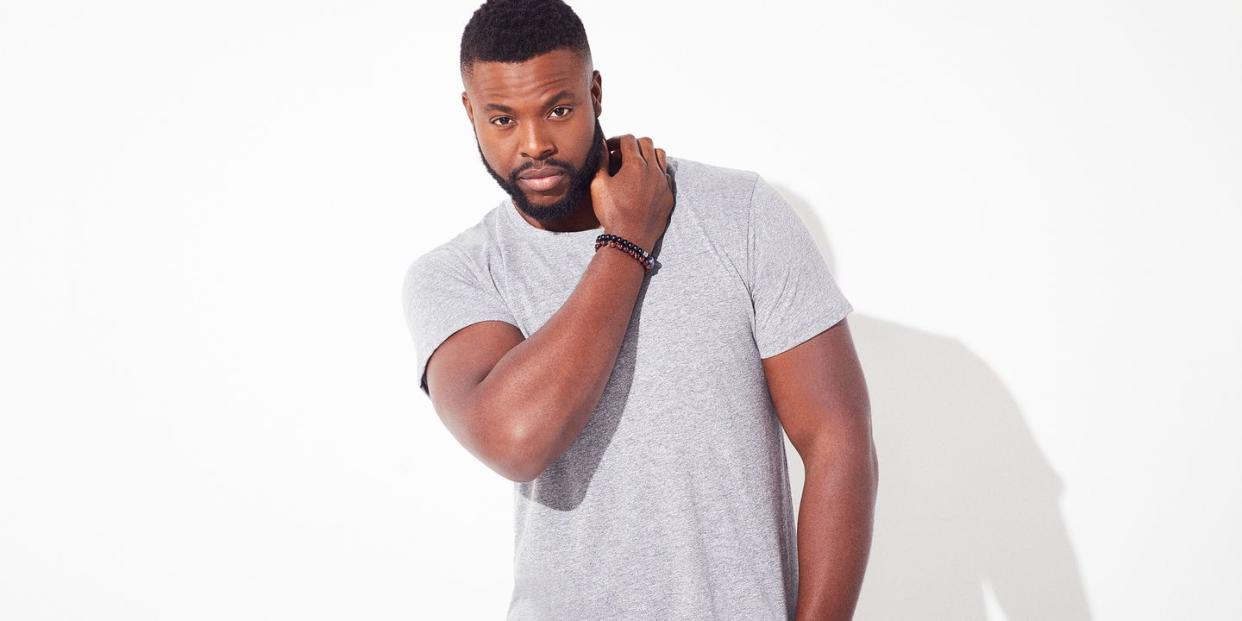
In late 2016, shortly after finding out he'd been cast as M'Baku in Black Panther - and the news of his casting had quickly made its way online - Winston Duke went to Blastoff Comics in North Hollywood to begin research for his first-ever movie role.
“I went in there, and the guy recognized me,” Duke says, “and he just pulled out all the comics that my character had ever appeared in.”
He started reading like crazy, immersing himself in the fictional African nation of Wakanda, an Afrofuturist utopia “that exists outside of the -isms - racism, colonialism,” as Duke explains. “It’s a world that doesn’t define itself in proximity to whiteness.” A few weeks later, the film began shooting during a time when the real world faced its own uncertainty: President Donald Trump had taken the Oath of Office amid a resurgence of white nationalism in America.
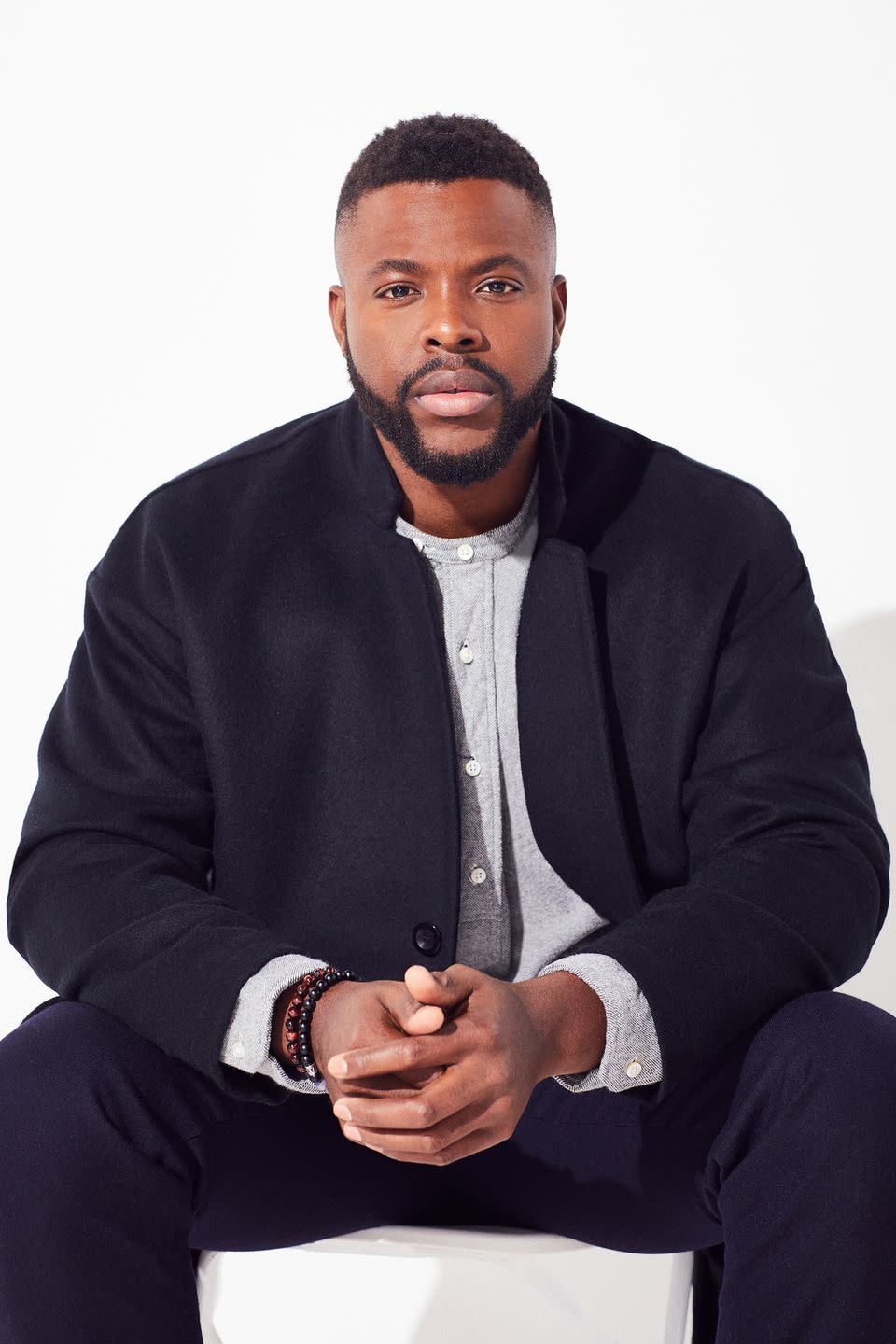
Topcoat by John Elliott; shirt and trousers by Engineered Garments.
“After that election it was like, What’s next? We went into this movie wondering, Oh my God, is the world ready for this film? Like so many people in the country, I was wondering where I stood - wondering where my narratives stood,” Duke says. “Going into that, and making this film, I just hoped and prayed that this film could be received for all that it can be.”
But as Trump tried and failed with his immigration ban and kept shouting about building walls, Duke went to work every day with a group of black creatives - director Ryan Coogler and co-stars Chadwick Boseman, Michael B. Jordan, Lupita Nyong’o, Danai Gurira, Daniel Kaluuya, and Letita Wright - working to do the opposite.
“It was a deep, wonderful respite from the current events. It challenged the national narratives of what it means to be a citizen of a country,” Duke says. “What is your duty to a country? Do you follow it blindly? Or do you challenge your country to be better and stand up to the ideals that all men are created equal and everyone deserves equity not just equality. What kind of world do we create when we only think of ourselves and horde resources when we’re part of a global economy?”
That's the central theme of Black Panther, a refreshingly deep installment into the Marvel universe that elegantly uses the story of Boseman's T'Challa to mirror America's global political positioning. As T'Challa becomes the king of Wakanda, he shoulders the responsibility of defending the nation's stronghold of vibranium, which has historically protected the resource through strict isolationism. The country has closed its borders to refugees and outsiders of any kind for fear of the troubles they could bring. But Jordan's Eric Killmonger is an American with ties to Wakanda who wants to use the nation's resources to help oppressed people around the globe. He's a sympathetic character, one that helps T'Challa understand the mistakes of Wakanda's past and its role in a globalized society. It's a nuanced conflict, and one that presents a truly sophisticated compromise in the end.

Meanwhile, Duke's M'Baku is the leader of an outsider tribe within Wakanda, who challenges the established order of T’Challa’s ruling family. As M’Baku and T’Challa eventually learn to work together to make Wakanda a stronger nation, his own conflict works as somewhat of a microcosm of the greater issue - showing how these problems can be resolved within and beyond borders.
The idea of Black Panther - a modern action film starring and heralded by non-white creatives - is the type of world Duke grew up with in Trinidad and Tobago. His mother owned a restaurant in the small village of Argyle on eastern Tobago. He calls it an intersection of culture, where he was surrounded by people of African, Indian, and indigenous descent. The restaurant where he’d work running errands or greeting guests was a tourist hub where he’d meet travelers. There, he lived in a culture passed down through oral storytelling, where the elders would talk about spirits in the forests, a woman taken by mermaids, and “people in the community who supposedly had superpowers and would roam the streets at night as animals.”
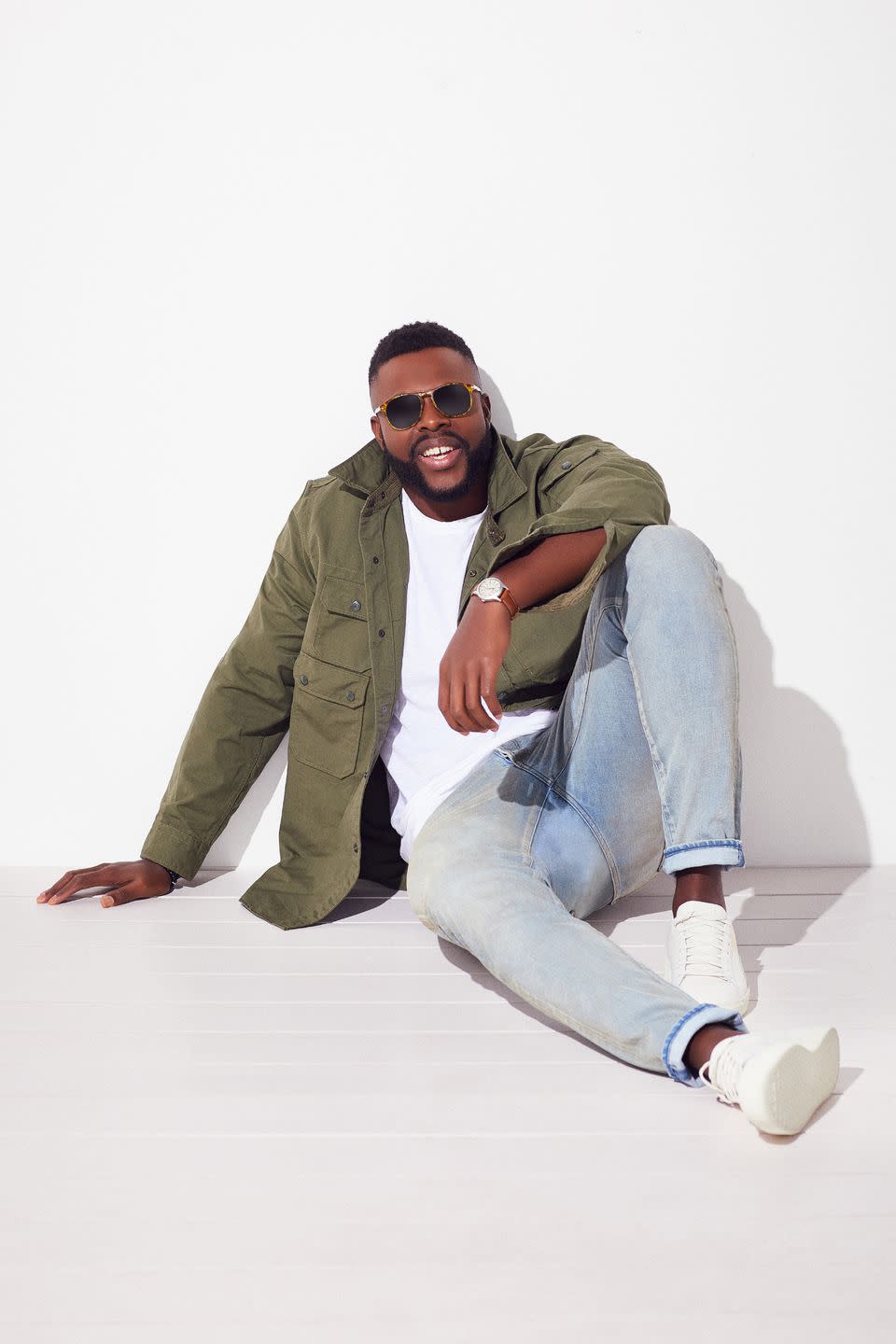
Sunglasses by Persol; shirt jacket by Engineered Garments; watch by Timex; T-shirt by Everlane; jeans by John Elliott; sneakers by Puma.
His heroes were the stars of the Bollywood films he’d watch with his family on Sundays, movies that would inspire his own recreations. “At the end of the day me and my cousins would go down to the beach, and I’d make an obstacle course and we’d try to do the things we saw in the movie,” Duke says. “I was seeing people of color growing up in my media. I was seeing them in positions of power.”
After graduating from high school, Duke’s sister wanted to become a doctor. His mother, knowing that wasn’t possible in Trinidad and Tobago, sold the restaurant and everything they owned and move the family to Brooklyn. Within a year, Duke found himself in a country where films and TV shows he watched and the media he consumed looked much different.
“Any time I saw black people on TV or in film, they were victims,” Duke says. “Or they were purputrating some sort of crime and they were the villain, or they were only subservient [to the main characters].”
He was drawn to American sitcoms to learn the country’s culture - specifically Family Matters, The Fresh Prince of Bel-Air, and Martin, which were “amazing respites of blackness on TV.” It wasn’t until later in high school when he finally started considering acting after spending weeks recreating an episode of Frasier.
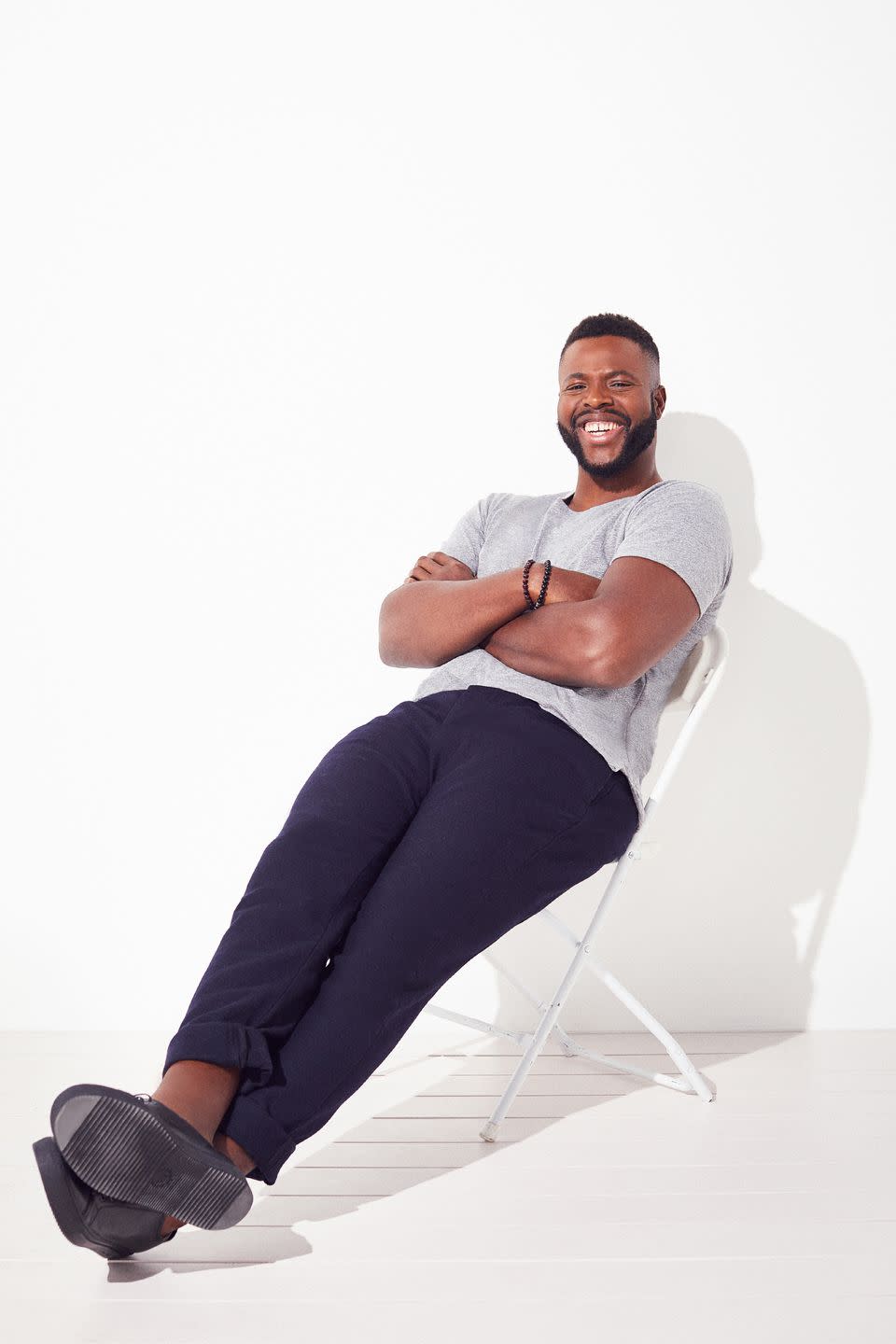
T-shirt by John Elliott; trousers by Engineered Garments; sneakers by Del Toro.
Encouraged by his mother and sister (who became a doctor, by the way, after going to medical school at Johns Hopkins), Duke pursued acting, earning his undergraduate degree in theater at University of Buffalo then attending Yale for his MFA.
On his first day at Yale, he was given a tour of the university by another aspiring actor, Lupita Nyong’o (who later won the Oscar for Best Supporting Actress for 12 Years a Slave and also appears alongside Duke in Black Panther). They became friends and soon joined a group at Yale called FOLKS (started by Black Panther co-star Angela Bassett during her time at the school), which gave black students an opportunity to meet and congregate.
“She and I became really close because we shared that immigrant experience,” Duke says. “We shared the idea of having really big dreams knowing that we’d left our own country.”
While they were at Yale, the two went to see The Avengers together and dreamed of someday being a part of a film of that magnitude. Even then, however, Duke says the idea of a black Marvel superhero film felt distant. “We would always tell ourselves that they’re going to do it someday, but we could never tell who,” Duke says. “At that point there was already the Blade films, but we really didn’t know how Marvel would go about doing their first African superhero.”
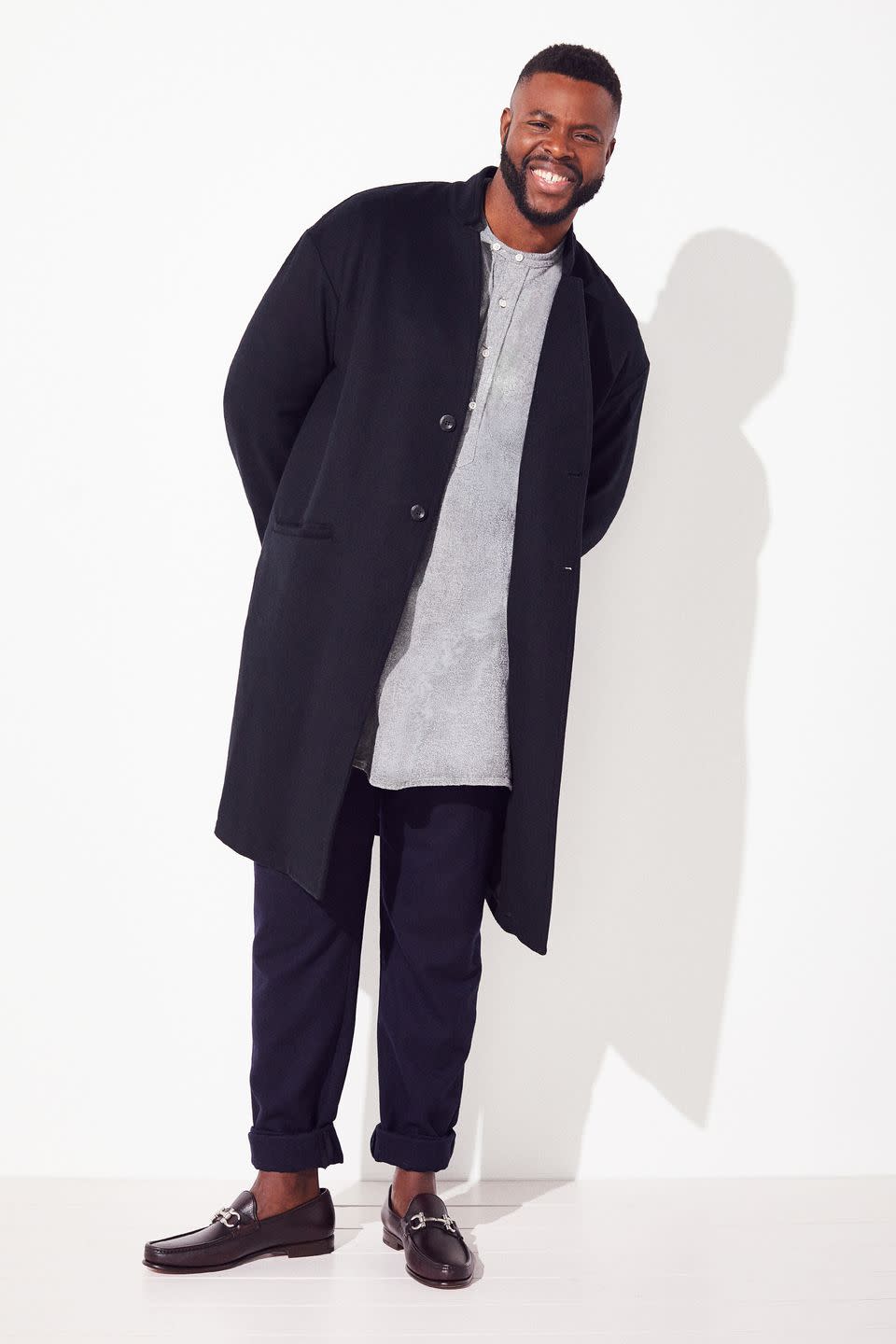
Topcoat by John Elliott; shirt and trousers by Engineered Garments; loafers by Salvatore Ferragamo.
After Yale, as Duke began pursuing a serious career in acting, he set a goal for himself: He would only do work with some sort of social justice footprint. “Whether it’s a deeply commercial vehicle it should still be connected in some way to social justice,” he says. “It should still have some sort of effect showing diversity, and heroes and anti-heroes re-defining heroism and what it means to be a strong person.”
He took a few TV parts in shows like Person of Interest and Modern Family, but most of the roles that came his way didn’t meet his criteria. “There would always be scripts that came along that I turned down, like Gang Member #5 - roles that were just stereotypes,” he says.
After mentioning to his management that he respected the work and mission of Ryan Coogler, he eventually got the chance to audition for M’Baku in Black Panther in August 2016. He got a callback a month later, and a few weeks after that he found himself face to face with the man he saw make his superhero debut in Captain America: Civil War a few months earlier. Despite his nerves, he ended up wrestling with star Chadwick Boseman. “I was like, I don’t know if this is where we’re supposed to go, but I’m going with it,” Duke says.
It worked, and he found out he had the part soon afterward. “It was immense. I was crying for a bit,” Duke says. “I started dreaming again.”
In the greater kingdom of Wakanda, Jabari Village is an isolated settlement that exists largely outside the country’s mainstream culture. This tribe disagrees with the leadership of T’Challa’s family, and when it comes time for the young hero to be made king, and given the powers of Black Panther, M’Baku makes his grand entrance.
As tradition goes, before naming a new king, the Wakandans are given an opportunity to challenge for the crown in combat. At the foot of a waterfall in an ankle deep pool, the leaders of various tribes watching from the sides of the cliff, M’Baku challenges T’Challa and the nation as a whole. It’s a beautiful entrance, possibly the greatest any character is given in Marvel history, and a moment when both M’Baku and T’Challa - young leaders - must prove themselves.

Sunglasses by Persol; shirt jacket by Engineered Garments; watch by Timex; T-shirt by Everlane.
“He himself was making a debut,” Duke says of his character. “He within his culture and his world is walking into the center of Wakandan society and politics and all these people. He’s walking in and saying, ‘You’ve had your eyes closed to me and mine for far too long, and I’m here to make myself known. I’m here to make my mark. I’m here.’” The similarities between M’Baku and the actor who plays him were not lost on Duke, whose role in Black Panther marks his film debut. “I could deeply identify with M’Baku in that moment,” Duke says. “My task in that scene was to wake the world up. I was waking up Wakanda from this malaise. He’s holding them accountable to be something better. It’s not that he’s trying to return Wakanda to antiquity, but they need to remember and have reverence to their history and the culture. That’s the only way that we can make it forward.”
Though M’Baku is usually depicted as a villain in the comics, Duke’s take on the character - like every other hero or villain in Black Panther - is more complicated than that.
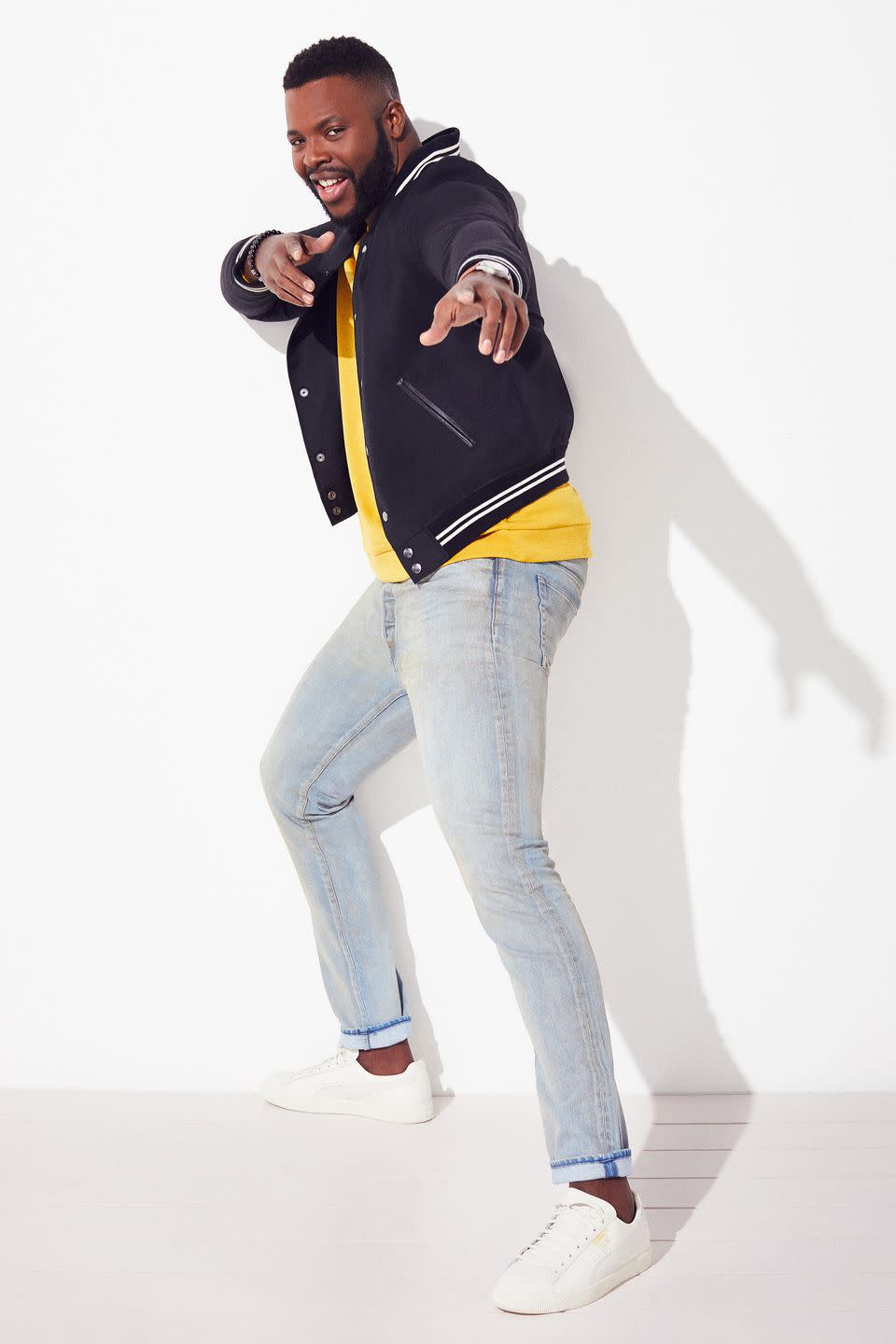
Jacket and jeans by John Elliott; sweater by Cos; watch by Timex; sneakers by Puma.
“We have more that connects us than separates us,” he says. “It’s only until we confront the darkness of our past that we can responsibly move forward. If you look at what this is and what this narrative evolves, it’s a country that has its own dark past.”
That’s the beautiful, complex idea of Black Panther - a lesson that millions of people learned over the film’s opening weekend, which earned a record-breaking $235 million at the box office. Schools bought out entire theaters to see this idealized version of global society, and kids saw heroes like them fighting an evil far more real than a monster from another planet or a nihilist clown. For young people sitting in the theater watching Black Panther, Duke says the movie “will make a bold statement: All my dreams are valid and possible. All my narratives are worthy of investment, dissemination, and celebration.”
Certainly, Black Panther did all that for Winston Duke.
Lead image: Jacket by John Elliott; sweater by Cos.
Photography by Kat Wirsing • Styling by Christine Flammia • Grooming by Danielle Crawford
You Might Also Like

